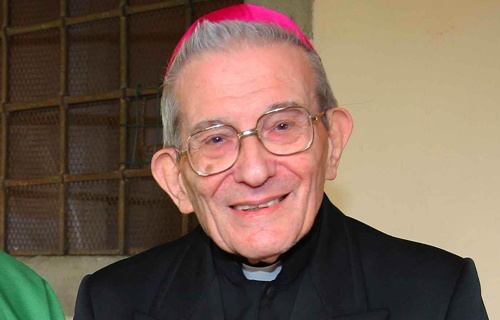Gentleman secretary of Pope John XXIII
Cardinal Loris Francesco Capovilla died on May 25, 2016, at the age of 100.
Jun 13, 2016

By Massimo Faggioli
Cardinal Loris Francesco Capovilla died on May 25, 2016, at the age of 100. He was the oldest living cardinal but, more importantly, he had served as secretary for Angelo Giuseppe Roncalli — Pope John XXIII — from the latter’s appointment to the patriarchal see of Venice until his death on June 3, 1963. Capovilla was only made a cardinal at the consistory of February 2014, by Pope Francis, after John Paul II and Benedict XVI — who created 231 and 93 cardinals, respectively — had forgotten him. They had had their chances, especially after 1995, when Capovilla turned 80, the age at which a cardinal loses the right to vote for pope and when such an appointment would have been electorally meaningless. It would have been a good way to thank him for his service to the global Church in keeping alive the memory of John XXIII and of Vatican II.
As executor of Roncalli’s will and secretary of his archive, Capovilla played a critical role in helping establish the late pontiff’s legacy. Rather than jealously guard the personal diaries and other writings of Roncalli until the time was deemed right, Capovilla acted on Roncalli’s desire as a historian to have them published and made part of the reception of the pontificate and of Vatican II. Coupled with his efforts in the publication of Journal of a Soul just nine months after John XXIII’s death, this work not only helped in defining the perception of John XXIII’s spirituality, but also made possible the wave of scholarly research on Roncalli that commenced in the early 1980s. Capovilla had donated the personal archive to Paul VI, but only after having provided a photocopy of the entire contents to the John XXIII Foundation for Religious Studies in Bologna, where historians had access to it. The work they did proved crucial in the beatification of Pope John in 2000 and his canonization in April 2014. It was also instrumental in helping us learn more about Vatican II (especially the decision to call the council in the first place) and about the background of John XXIII’s pontificate. Capovilla was averse to saccharine devotional portraits of il papa buono, and the letters, journals, scholarly and spiritual writings he helped bring to light significantly impacted the work of scholars like my mentor Giuseppe Alberigo, Alberto Melloni, and Giancarlo Zizola. Thanks to this paper trail — which also included daily diary entries from the time Roncalli was a teenager in seminary — we know more about John XXIII than we do about any other pope.
But there is another important reason to remember Capovilla. As secretary of the pope succeeding Pius XII, who governed in almost total isolation, Capovilla had the delicate job of navigating the arcana of the Roman Curia, where many saw Roncalli as a dangerous and naïve outsider. Audiences and meetings that resulted in some of the most consequential decisions by John XXIII were made possible by Capovilla, who bypassed the obstacles put up by the Curia. This helped John XXIII do what John XXIII wanted to do. But Capovilla operated differently than did his successors — namely, the secretaries to John Paul II and Benedict XVI. -- Commonweal







Total Comments:0